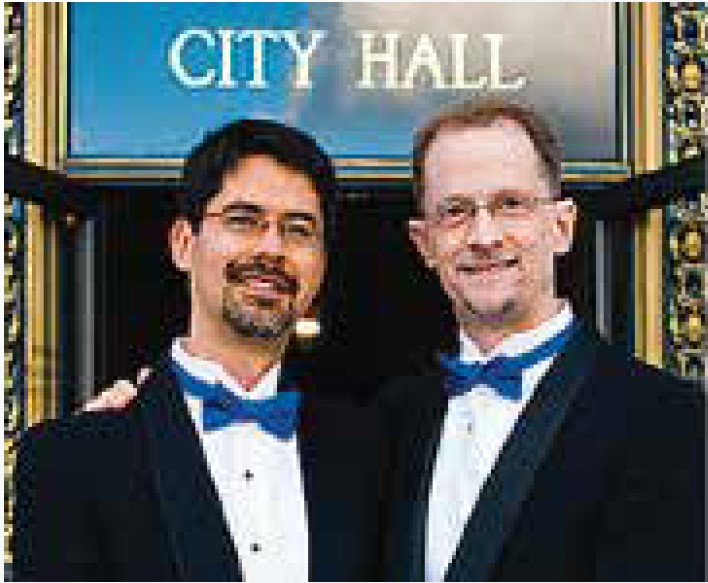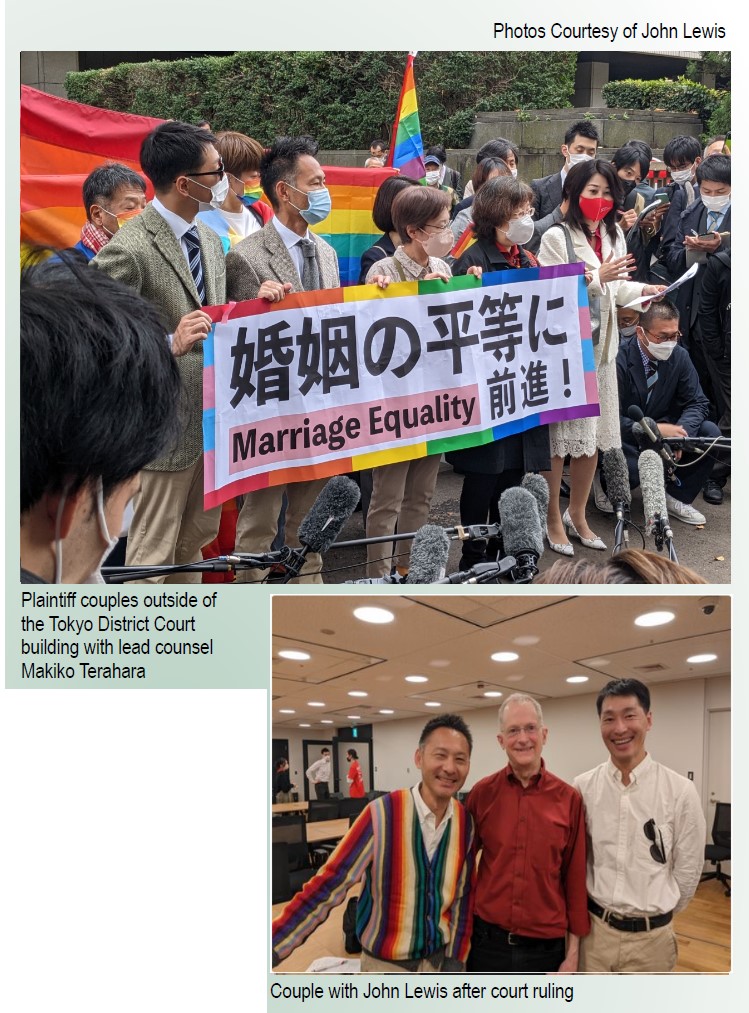
By John Lewis–
A few weeks ago, I was with hundreds of other LGBTIQ people and supporters outside the Tokyo District Court building awaiting the court’s decision in an historic Japanese marriage equality lawsuit when I received astonishing marriage equality news from nearly 7,000 miles away. The U.S. Senate cleared the way for passage of the Respect for Marriage Act with a super-majority that included an astounding twelve Republican senators.
Passage of the Respect for Marriage Act (RFMA) is an extraordinary achievement for the American marriage equality movement after years of struggle and continual hard work. We remember how incensed we were 26 years ago in September 1996 when Congress overwhelmingly passed the notorious Defense of Marriage Act (DOMA), and President Bill Clinton signed it into law in an act of political cowardice.

Republicans sponsored DOMA as a cynical political ploy in a Presidential election year to put President Clinton and other Democrats in the hot seat. All Republicans save one and a majority of Democrats, including liberal stalwarts such as Senators Paul Wellstone, Patrick Leahy, and Carl Levin, as well as then-Senator Joe Biden, voted in favor. It felt as if virtually no one was truly on our side.
Eight years later, it got worse. President George W. Bush and many of his fellow Republicans proposed a federal constitutional amendment to ban same-sex marriage nationwide, again as part of political tactics to stoke homophobic fears and gain Republican votes in a Presidential election year. Over time, Republicans introduced various versions of the anti-equality amendment. A 2005 Senate version had 33 sponsors, and a 2006 House one had 135 sponsors.
From 2004–2008, 31 states voted against marriage equality in statewide referenda, sponsored by conversative political forces to raise money and gain power on the backs of queer couples. The Proposition 8 campaign to take away the freedom to marry in California alone raised $22 million dollars, nearly 40% of it from members of the Mormon Church.

In light of this history, passage of RFMA, although not perfect legislation, marks an enormous milestone. RFMA represents bipartisan Congressional affirmation of the principles of LGBTIQ equality and freedom at the heart of the Supreme Court’s landmark Windsor and Obergefell marriage equality decisions. RFMA wipes DOMA off the books once and for all, and it stipulates that the federal government and states must recognize marriages of LGBTIQ couples that were valid wherever they were performed even if the Supreme Court were to reverse its marriage equality landmarks—something extreme conservatives on the Court currently lack the votes to do. And in a dramatic reversal, the Mormon Church even supported the bill, claiming it did so because RFMA contains religious exemptions that, in fact, are already generally established in law.
Across the Pacific Ocean in Tokyo, the court issued a decidedly timid and ambiguous decision in the historic marriage equality lawsuit brought by Japanese queer couples. It ruled that the lack of a legal system in Japan that recognized same sex couples as family violated the Japanese Constitution’s guarantees of “individual dignity and the right to equality.” But it also held that the nation’s constitution excluded same-sex couples from marriage. The Court made no comment on how a future court should rule if the Japanese Parliament (known as the Diet) continues to sit on its hands and do nothing, leaving same-sex couples with no rights or protections under Japanese law.
The Tokyo decision was just a lower court decision with additional decisions from other district and appellate courts and the Japanese Supreme Court yet to come. A lot of political organizing and lobbying in the very conservative Diet remains to be done as well.
The concurrent passage of RFMA and the recent Tokyo marriage equality decision left us pondering many things. RFMA is a great victory, but it came over a quarter century since passage of DOMA and 18 years after San Francisco’s glorious Winter of Love. Was that a short or very long time, or both?
Why did the Mormon Church put us through the nightmare of Prop. 8, just to turn around and support nationwide marriage equality 14 years later? Sadly, the Mormon Church’s official statement supporting RFMA took no responsibility for the harm they caused millions of LGBTIQ people, their children, family, and friends.
The Japanese courts and legislators often speak of gradual change taking place in Japanese society and the need for careful consideration going forward. But public support for marriage equality in Japan is already strong, and time ran out for one of the plaintiffs in the Tokyo case who died last year. Another plaintiff, who gave extremely forthcoming testimony in the case—something requiring exceptional courage in Japan—was dismayed with the court’s recent decision, wondering aloud why he and his fiancé went through it all if this was the result. The entrenched conservative politicians, who lead the governing Jiminto party and are likely still influenced by the Unification Church and other right-wing interest groups, appear to be the real roadblocks to equality in Japan.
What sustains us most going forward in the global movement for LGBTIQ equality are the many times we feel genuine connection and mutual support with others in the movement. Those moments give us profound conviction about and confidence in the inherent worth and goodness of the LGBTIQ movement and the queer community at its best. Happy holidays, everyone, and onward together in 2023!
John Lewis and Stuart Gaffney, together for over three decades, were plaintiffs in the California case for equal marriage rights decided by the California Supreme Court in 2008. Their leadership in the grassroots organization Marriage Equality USA contributed in 2015 to making same-sex marriage legal nationwide.
6/26 and Beyond
Published on December 15, 2022
Recent Comments